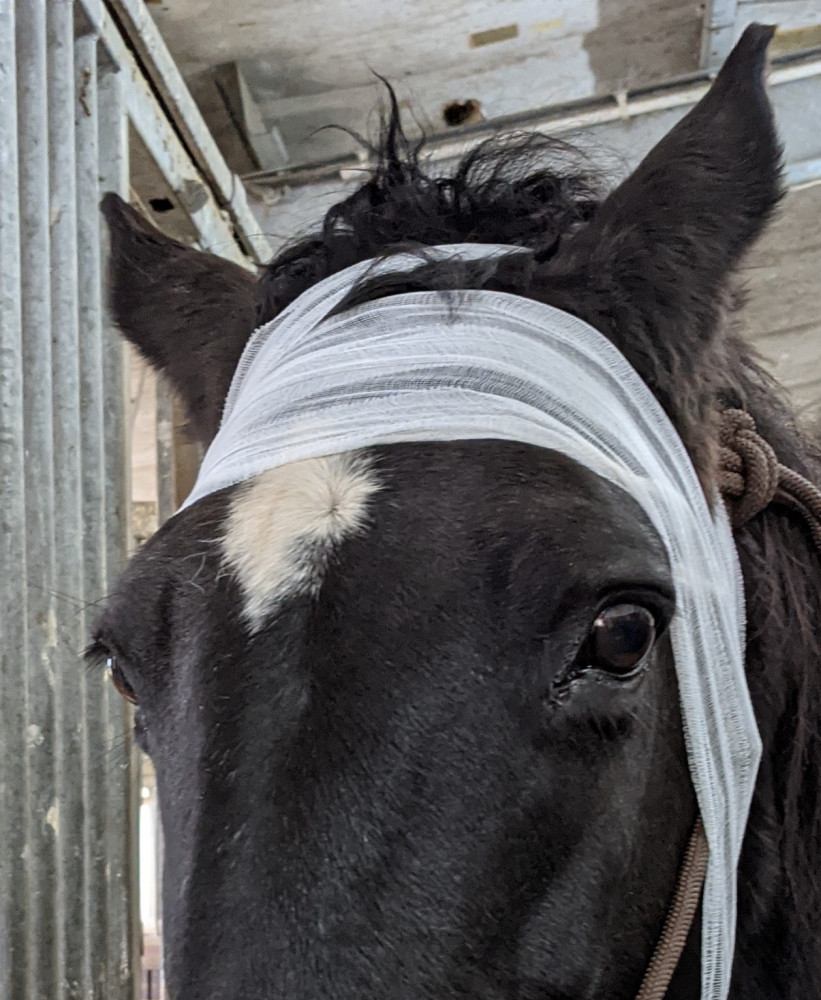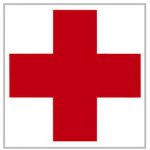Horse colic – origin, symptoms, therapy
 Nearly every horse once in his life suffers from colic.
Nearly every horse once in his life suffers from colic.
However this term does not stand for a specific disease but for a general dysfunction of the gastrointestinal tract.
If a horse suffers from colic the most important thing is to react quickly. If the horse owner directly starts with the respective immediate measures a critical health situation can be prevented. In general colic is a disease of the whole gastrointestinal tract which can be caused by many different origins. The anatomy of the horse facilitates the disease. Therefore colic in some cases is not only caused by wrong human behavior. In any case colic is a very dangerous illness and many horses already died from it.
The different origins of colic
Generally there are many different origins for colic so that sometimes it can be really difficult to identify the exact reason. In many cases colic is caused if horses simply eat too much. Especially voracious horses are in danger and easily overload their stomach. This causes a strain of the stomach and the horse suffers from great pain. Wrong feeding can also cause a distension of the large intestine. In worst case this can even lead to a chap of the intestine. Besides wrong feeding also psychical stress can lead to colic. This stress can be caused by long and exhausting transports, too many participations at championships or a change of the usual environment (e.g. stable). This type of colic is called “spasmodic colic” because all the muscles in the gastrointestinal area convulse and cause pain. Additionally a spasmodic colic can originate from an overdosing of cold water. A further type of colic is caused by a sudden change in weather. Due to this change of the temperature the circulation of the horse becomes weak and all organs and especially the gastrointestinal tract slow down their processes. The digestion of the fodder takes too long time and in worst case this can lead to a disruption of the whole gastrointestinal tract. However the worst type of colic is the torsion. The anatomy of the horse makes it easy that certain parts twist upon themselves. Especially foals often suffer from this type of colic. Horses with a torsion have the worst pain and tend to lay down all the time. They immediately need the help of a vet.
If the horse is allergic against certain components of the feed it can suffer from a chronic colic. In this case it can take a very long time until you finally find the cause of the colic. Allergies are a serious equine disease. Here you can find all information about causes, symptoms, diagnosis and treatment.
Further crucial factors which lead to colic
There are further factors which facilitate colic. The most crucial point is a lack of movement. This causes a slowdown of the digestive processes so that the fodder accumulates. In worst case this ends in a disruption of the gastrointestinal tract. Moreover a parasite infestation is very dangerous for the entire flora of the gastrointestinal tract and weakens the natural regulation system. In general a change of the riding or fodder habits always causes a change of the organism and therefore of the entire gastrointestinal tract. Sometimes this new organization of the body can lead stress and then as a result to colic.
Symptoms of a colic
There are many different symptoms for a colic. The disease can quickly lead to a crucial health situation of the horse. This fact underlines the importance that horse owners are able to directly start with Basic Life Support. Generally the symptoms can be divided into two different groups. Firstly there are symptoms for a light colic which mostly can be cured without the help of a vet. The horse is really nervous and jittery and always tries to turn his head towards the stomach. Additionally the horse uses the hind legs to kick towards his stomach so that it becomes clear where the pain originally comes from. Further nervous movements are the pawing with the front legs and flehming. The horse refuses any kind of water or fodder and tends to lay down. This can also happen all of a sudden and unexpectedly so that especially the person around the respective horse needs to be aware of swirling hooves.
If the health situation of the horse already is worse the animal suffers from greater pain and shows further symptoms. The horse has red eyes which are wide open so that you can really see the expression of pain in his face. The nervousness of the horses gets stressed through the gasp, the raised pulse (if you count more than 52 beats per minute this is a raised pulse) and the sudden attacks of sweating. The patient tends to lay down or tries to sit down in a dog position. If your horse offers these kinds of symptoms the health of the animal is in a crucial situation and you immediately need to call a vet.
All symptoms of a colic can easily be mixed up with the symptoms of the muscle diseases Tying Up or HYPP.
Possible therapies of colic
Colic is a dangerous disease. If the therapy does not start immediately, the horse dies from a circulatory collapse. Therefore it is crucial to early recognize the symptoms and decide whether to contact a vet or not.
If you recognize the symptoms of a light colic and immediately begin with the Basic Life Support you normally do not need a vet. However it can be really helpful to contact another experienced member of the stable which can give you advices and help you to stay calm and relaxed. Firstly you need to remove all hay, stray and fodder so that the horse only has access to water. Then, every half an hour the horse needs to get slowly moved for five minutes. The respective person who is walking next to the horse needs to be really careful because the horse can suddenly lay down at any time. The slow movement can help to stabilize the circulatory system and to loosen the muscles. However, if the circulatory system already is too weak you should give a possibility to the horse to lay down. In this case you need to make sure that the horse cannot hurt his legs or other parts of the body in the box (remove all sharp things and litter down sawdust). The health situation of the horse needs to be controlled regularly (at least every 20 minutes). If it does not become better but the horse resists to lay down you need to contact a vet. Until the arrival of the vet you need to try on to slowly move the animal. In any case you should never give any medicine on your own! This is only the job of the vet.
If the health situation of the horse already is crucial you need to immediately call a vet. Until the arrival of the vet you can already start with the Basic Life Support as described above. Therefore you can start to slowly move the horse to support the gastrointestinal tract and the relaxation of the muscles. If the pain however is too big the horse will refuse this movement and will resist to lay down in the box. As soon as the vet arrives he will start with the medical examination. At first he takes the horses pulse and meters the temperature and the breathing frequency. If the horse is too nervous the vet will sedate the horse for further medical examinations. The vet will sound the flank of the patient with a stethoscope to get a hint of the borborygmus. In some cases the vet enters a nasal gastric tube through the nose of the horse. This leads from the esophagus until the stomach so that gases and liquids can flow out of the body. Indeed this is very important because horses cannot vomit so that there is no other possibility that the gases and liquids get excreted. Additionally the vet may make a rectal examination of the horse to identify the exact origin of the colic. A blood test can give further hints for the cause of the disease. The results of the medical examination are the base for the next steps of the therapy. If the health of the patient is in a crucial situation the horse needs to get transported to an animal clinic. If the horse is very nervous sometimes the transport is not possible without any further sedatives. In worst case the vets need to make a surgery in the clinic: all parts of the gastrointestinal tract get controlled and necrotic parts are removed. However, if the health situation of the horse is not that crucial and the patient does not need to be transported to a clinic it may already help to administer medicine at the current location. These medicines help to alleviate the pain, relax the muscles and stabilize the circulation system. After the administration you regularly need to check the health situation of the horse. If the medicine helps the horse will begin to slowly eat again after one hour.
Prevention measures
The horse has an anatomy of the gastrointestinal tract and a function of these respective organs which generally is very susceptible for colic. Therefore some types of colic cannot be prevented and therefore are not caused by wrong human behavior. However, this does not apply for all forms of colic so that there are measures which help to prevent the origin of this disease:
- Horses always need an access to clean water.
- Horses need a lot of movement. A species-appropriate husbandry and regularly movement is one of the most important conditions for the prevention of colic and any other disease.
- If you plan a change of the fodder you should do this in small steps and over a period of at least two weeks.
- In general the daily fodder ration should be divided into several small portions. Then you can feed these small portions over the whole day. This prevents a sudden overload of the stomach but gives him continuous and small portions for the digestion.
- You should never feed beet slices if they are not soaked.
- Horses should not have the possibility to eat too much sand in their box or on the pasture.
- A horse needs routine. The horse owner should try to keep the environment and the daily rhythm as continuous as possible. This especially prevents spasmodic colics.
- If your horse tends to eat too much you should change the litter in the box from straw to sawdust or scraps of paper.
- In general it is really important to make regularly dewormings because worms always attack the natural flora of the entire gastrointestinal tract.
Surf tips:
- Deworming of horses – information and tips
- Did you know that pears can lead to coilc in a horse?
- Did you know that anis can prevent colics?
- Respiratory Disease- Bronchitis and Pneumonia
—All statements without guarantee—


9 Comments
Comments are closed.